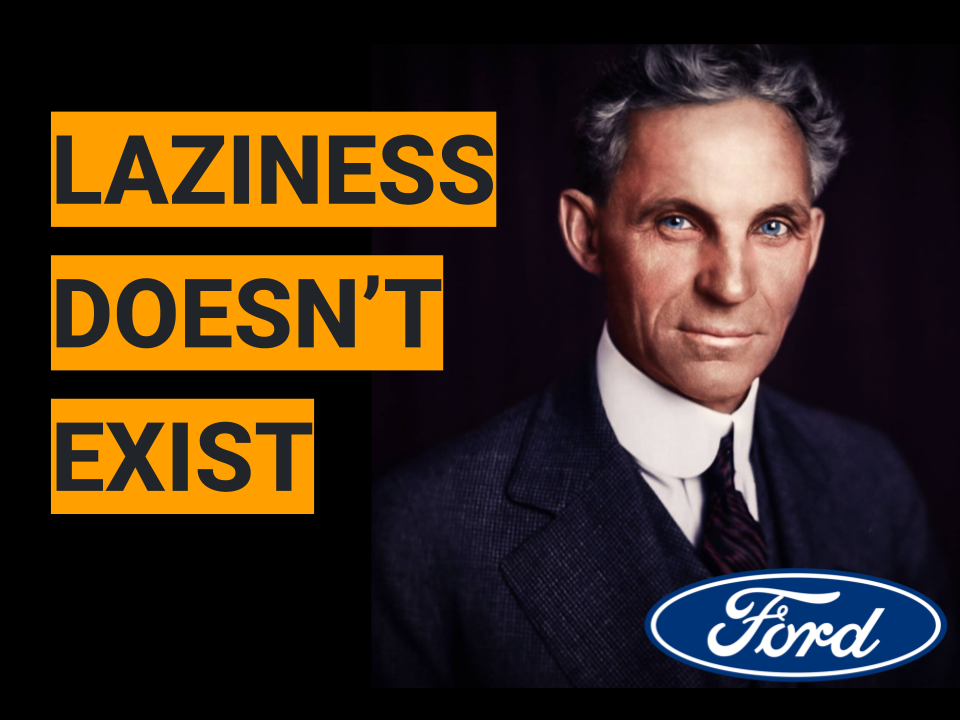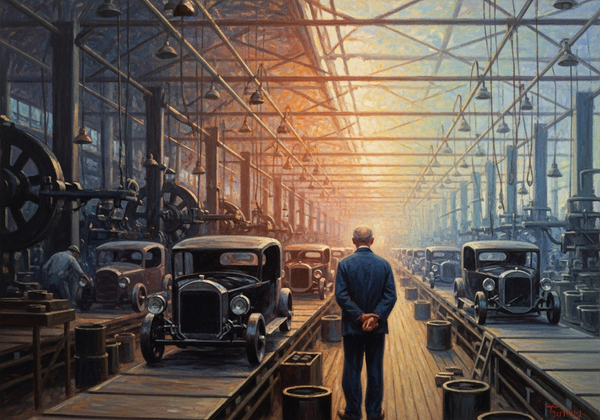Why did a neighbor call Henry Ford lazy?

Today, Ford is associated with increased productivity, mainly because of the invention of the assembly line; however, during his childhood, his reputation was quite the opposite.
On his family's Michigan farm in the 1870s, it was a standing joke. A neighbor who worked alongside him laughingly noted:
That little devil was the laziest bugger on the face of the earth!... Henry would work along all right until about ten o'clock in the morning, and then he would want to go to the house for a drink of water. He would go and get the drink of water, but he would never come back!
What if laziness doesn't exist? And is it just the word we use for a type of work we don't yet understand?
So, what was the so-called "lazy" boy really up to? He wasn't just lying around in a field. Instead, he often escaped to his small workshop, where he was totally absorbed in his work—a quiet, hands-on exploration of machines. People loved to talk about this to him. During Christmas, his siblings would joke, 'Don’t let Henry have any new wind-up toys! He'll just take them apart." But he wasn't destroying them; he was investigating them carefully and respectfully. He’d open up the metal casings, laying out tiny gears and springs in perfect rows, almost like he'd discovered a new world. To him, these tiny parts held a secret language—an unseen code that his world couldn't easily understand, but he was determined to unlock its mysteries.
This act of deconstruction revealed two very different images of the same boy to his parents. His father, William, looked at Henry’s grease-stained hands and saw a failure. He worried, telling a neighbor:
William valued hard, tangible work and couldn’t see Henry’s potential.
But Henry’s mother, Mary, looked at him differently. She saw a budding genius and understood her son perfectly. As Henry later recalled:
For her, Henry’s hands and disinterest in fields were signs of a bright future in mechanics, not failure.
These were not just two parental opinions. They were the two great philosophies battling for America's soul. William represented the Agricultural Age, an era where value was measured in physical input—in sweat—because that was all that stood between society and starvation. In his world, a boy who didn't work the land was a broken part in the system of survival.
Mary, however, embodied the coming Industrial Age, a new philosophy where the output is what really matters. Her worldview didn't celebrate wasted effort; it championed efficiency. It was a belief that the goal wasn't to work harder, but to find a smarter way.
Therefore, to understand Henry Ford's Laziness, we must first explore the worlds of his two parents.
First, there was the world of his father, William Ford. It was a world built on the foundation of a trauma so deep it shaped every belief he held. Born in rural Ireland, William didn't just hear about the Great Famine; he survived it. He witnessed a catastrophe that transformed the green landscape of his home into a place of "poverty and desolation," a world where the very soil seemed to betray its people. For a young man to see starvation as a constant, silent predator—to live in a world where a lack of production literally meant death—America was not just a new country; it was a salvation. The rich Michigan farm was more than just property; it was a paradise of ownership and independence, a fortress against the ghost of scarcity he had outrun. His daughter later recalled his deep, almost religious reverence for this new life:
This is the key to understanding William. For him, physical labor wasn't just work; it was a matter of survival. His strong belief was that your worth comes from land productivity—sweat was the only currency that kept his scars from the famine healing. To William, seeing a boy refuse to work the land wasn’t just laziness; it was dangerous, a sign of disrespect for the miracle that kept him alive. His story shows us how deeply some tie their self-worth to their effort and labor.
Then, there was the world of his mother, Mary. It was a world of harmony, order, and quiet optimism. Unlike her husband, Mary was American-born. More than that, she was the adopted daughter of a local farmer, a true child of the Michigan frontier. Her identity wasn't tied to a past trauma that had been escaped, but to a present that was constantly being built and improved.
Her philosophy was not one of survival, but of progress. She saw the world not as a place to be endured, but as a system to be understood and improved. She was an intuitive engineer of her domestic world. According to Henry's sister, everyone admired "the systematic and orderly way in which her work was done." This was the principle she passed on to her son, the idea that would become the foundation of his entire industrial empire: results, not motion, are what really count.
For twelve years, Henry Ford lived in a house with these two conflicting philosophies, each born from a different past, each pointing toward a different future. William, with his love for the land, tried to anchor him to the safety of the 19th century. Mary, with her belief in a smarter way, gave him permission to dream of the 20th. She was the bridge between their two worlds, the mainspring that kept the family watch ticking in harmony.
And then, the mainspring broke.
In the spring of 1876, when Henry was twelve, Mary died in childbirth. The house, he would later say, became "like a watch without a mainspring."
And in that moment, Henry's world fractured. The emotional devastation was total. The one person who understood his nature was gone, leaving him alone in a world that saw him as defective. The quiet war of misunderstanding between a grieving father trying to anchor his son to the safety of the land, and a grieving son who now saw that land as a prison, intensified.
Here, we must pause to understand the immense psychological pressure on a father like William Ford. The 19th-century American worldview was not built on gentle encouragement; it was forged in the harsh realities of the frontier and steeped in a Puritan work ethic that saw idleness as a direct path to damnation. This wasn't just a cultural preference; it was a survival strategy. In a world without social safety nets, where a bad harvest could mean ruin, the belief that your worth is tied to the land's productivity was a community's primary defense against chaos.
Fathers of that era had a sacred duty: to build children who were resilient, hardworking, and useful. A child who rejected this model was not just a disappointment; they were a threat to the family's stability. Therefore, the society had to create a powerful psychological tool to enforce this code: it had to invent laziness as a moral corruption. It had to teach its children that their natural feelings of boredom, frustration, or desire for a different path were not valid instincts, but character flaws to be overcome. This is the second tenet of the Laziness Lie: you cannot trust your own feelings.
Without Mary as a mediator, William's fear for his son's future curdled into a quiet desperation. He saw Henry's retreat into the workshop not as innovation, but as a dangerous drift toward worthlessness. His attempts to "fix" his son became more insistent. The farm, with its endless, punishing rhythm, became the only solution he could offer.
For Henry, the house without its mainspring had become a prison of grief and misunderstanding. His "laziness"—that deep, instinctual revulsion to the brute-force inefficiency of the farm—was now his defining flaw in the eyes of the person whose approval he craved most. He was trapped in a world that told him his greatest gift was a sin.
His mechanical obsession intensified. It was no longer just a curiosity; it was an escape. His early experiments, like the crude steam engine that exploded and set the school fence on fire, were chaotic expressions of a mind searching for a new kind of order.
Then, a few months after his mother's death, came the moment that gave his rebellion a symbol. While riding with his father, he saw it: a Nichols, Shepard & Company steam engine, chugging along the road under its own power. He was mesmerized.
Here was the "Aha!" moment. That noisy, powerful, self-contained engine was everything the farm was not. It was a system. It was the future. It was the first external proof Henry had ever seen that his internal feelings were not a lie. The world could operate on a different principle. The engine didn't get tired. It didn't waste motion. It simply produced results.
In that instant, the vision crystallized. The boy who had been called "lazy" for his intolerance of farm work now had a mission. He would build a world where the machine did the heavy lifting, a world where his father's definition of work—and the Laziness Lie it was built upon—was irrelevant.
And so, in 1879, at the age of sixteen, Henry Ford made the only choice he could. He packed a small bag and walked the nine miles to Detroit. This wasn't just an act of ambition; it was an act of survival. He was escaping a world that had labeled his very nature as a defect. He wasn't just running from the heavy labor; he was running from the constant, quiet pain of being misunderstood. He was running to find a place where his mind could finally build something more valuable than a fortress of shame—a world that ran not on the punishing rhythm of the plow, but on the precise, logical, and relentless ticking of a watch.
Because sometimes, the world will label your greatest gift as your greatest flaw. And the courage to trust your own instincts, even when they are called 'laziness,' is the first step to building a future no one else can see.
